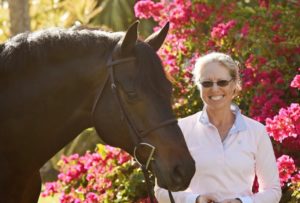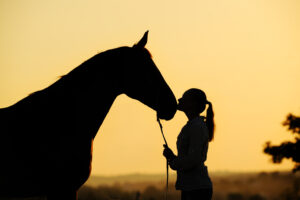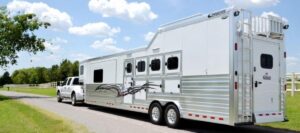USEF’s Hearing Committee has recently issued a number of decisions that shed light on a trainer’s liability for signing, or not signing, an entry blank. One complication to the entry process is that some circuits (like WEF) have you complete one official entry to get a back number at the start of the circuit, and then permit a weekly declaration, or “add” sheet, for entering specific classes each week. So a horse will be issued a back number based on an entry signed by Trainer #1, and may still be using that back number later in circuit despite having been transferred to the care, custody and control of Trainer #2. What to do?
Here are a few tips:
He who signs as “Trainer” on the entry is on the hook.
No ifs, ands, or buts. If you sign as “trainer” you are liable as “trainer.” If you are no longer the true trainer of the horse (for example, if it has been sold, leased or is being tried), or if the horse is being cared for by another trainer at any time, then to avoid liability it is your responsibility to go to the show office and make sure that Trainer #2 submits a completely new entry in his/her name and gets a new back number for the horse. During WEF, for example, the “add” sheets have a signature line, but management does not keep those sheets and whatever is entered on those sheets does not change the identity of the trainer as listed on the original entry.
It doesn’t really matter what it might say “in the computer” later on during circuit, because if the horse tests positive for a forbidden substance, then a copy of the original entry is sent to USEF and USEF relies on that information.
He who is listed as “Trainer” on the sample identification tag is also probably on the hook.
YES, it does matter who the drug testers are told is the “trainer” of the horse. USEF also is looking at what is written on the sample identification card. If the trainer listed on the sample identification card is different than the one who signed the entry blank, then it is possible that USEF will charge both trainers. But it is unlikely that what the drug testers are told will control, if that information is different than what the show office tells USEF.
A horse must have at least one trainer, but can have more than one trainer.
Every trainer is on the hook. And USEF doesn’t really care how the trainers perceive their role– lead trainer, assistant trainer, co-trainer, weekend trainer. Multiple trainers may point the finger at one another, but ultimately everyone is on the hook, even if one or more of those trainers did not sign the entry blank. Signing the entry blank is not what makes you the trainer. Doing “trainer-like” things with the horse makes you the trainer. If you do “trainer-like” things, you should be signing the entry blank. Thus,
He who acts like a trainer, shall sign as trainer.
Who decides what feed and medications the horse will get? Who establishes the horse’s riding/training schedule? Who is up at the ring schooling the horse (or horse/rider), and who is standing at the in-gate when the horse competes? He who is calling shots is a “trainer.”
He who thinks he is only a “coach,” shall sign as “coach,” and not do “trainer-like” things.
What is the difference between a “coach” and a “trainer”? The best (but not perfect) clarification I can give you on that point would be this: if all you do is show up at the schooling area before the horse shows, school the horse and watch it show, then you are a “coach.” For all practical purposes, a “coach” does not make decisions about things related to getting the horse to the ring, such as whether it gets lunged or for how long, what it eats, what medications it gets, what it eats, etc. If you sign as “coach,” there is no guarantee that USEF won’t charge you with a rules violation if there is one, and you may have to explain and defend your self-classification as a “coach” (as opposed to a “trainer”). But if all you do is show up to train at the ring when the horse is showing, then better to sign as “coach” than to not sign at all.
Sometimes, the drug testers do their own research.
I know of a case where a junior kept her horse at home, and her parents would act as her “grooms” and ship her to and from shows where she would meet her trainer. At one show, the junior’s regular trainer wasn’t available, so another trainer agreed to stand in for the day and “coach” her at the ring, but did not sign any entry as her “coach”. On her entry, one of her parents signed as “trainer.” The junior had friends who rode with this stand-in trainer, so she requested to be “stabled with” them at the show. When the junior’s horse tested positive, the “coach for a day” was charged with the violation as “trainer,” in addition to the parent who had signed the entry. It turned out that the drug testers had checked with the stabling office and based on the junior’s request to be “stabled with” the stand-in trainer, and the fact that the drug testers saw that professional helping the girl at the ring, they concluded that the “coach for a day” was responsible for the horse. Despite statements from both the junior’s parents and the coach, USEF concluded that the “coach for a day” should be penalized for the violation. In retrospect, it probably hurt the coach’s credibility that he hadn’t signed as “coach,” but when there was a problem that was the designation he preferred. I think if he had signed as “coach,” USEF probably would have let him off the hook.
The bottom line is that if you have anything to do with the care, custody or control of a horse, or the training of a horse or its rider, you are potentially liable if that horse tests positive for a prohibited or controlled substance. Not signing the entry blank isn’t the answer. But the biggest problem you may have at WEF is letting someone use a back number for an entry that you signed for as “trainer,” when the horse has left your care, custody and control for any period of time for whatever reason: lease, sale, or pre-purchase trial.








